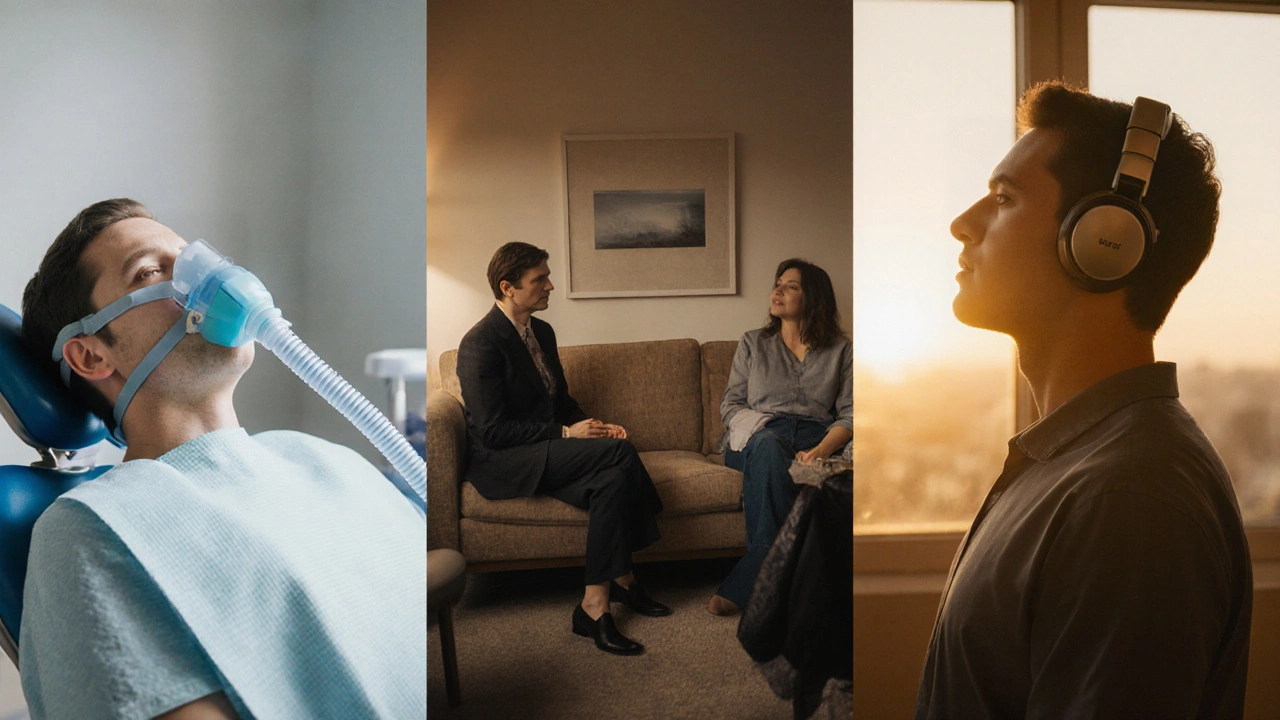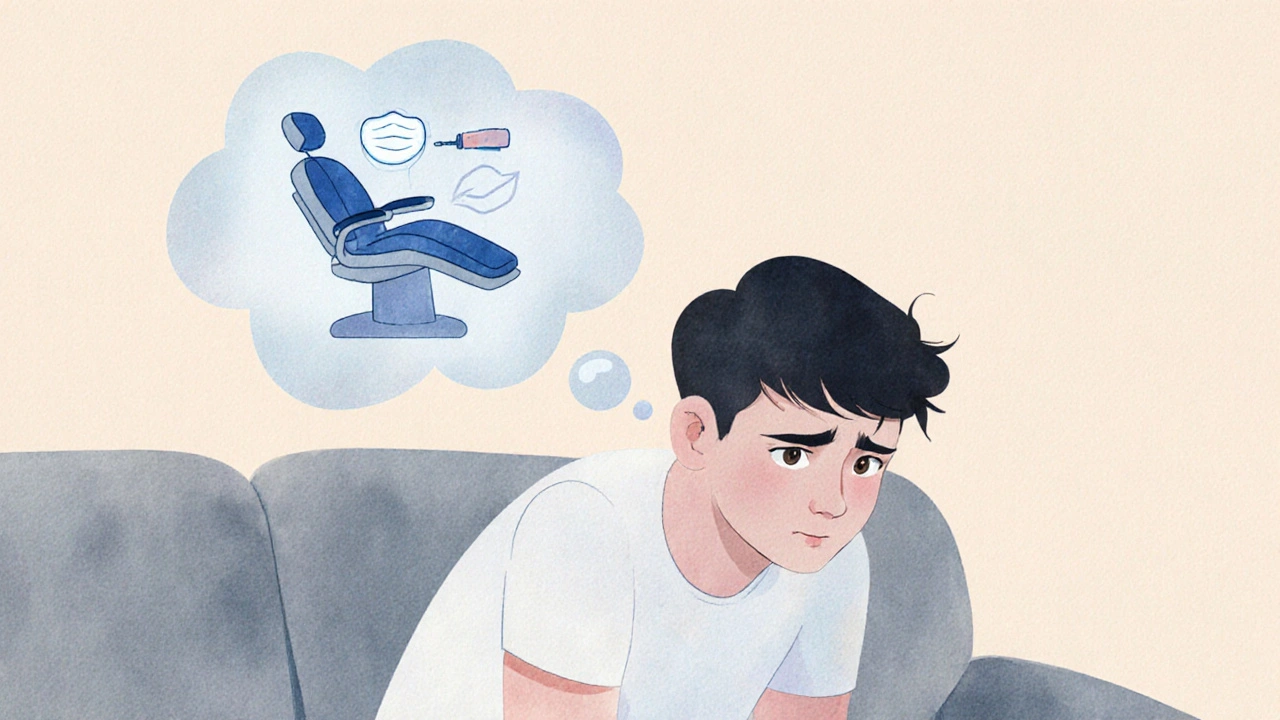Dental Anxiety Management Planner
Your Dental Anxiety Level
Select how much you experience dental anxiety:
Prevention Focus
Rate your current preventive habits:
Choose Your Anxiety Management Approach
Sedation Dentistry
Inhaled nitrous oxide or oral medications
Cost: $75-$200
Cognitive Behavioral Therapy
Therapist-guided thought restructuring
Cost: $100-$150/session
Relaxation Techniques
Breathing, music, visualization
Cost: Free to $30
Your Personalized Dental Anxiety Plan
Comparison of Anxiety Management Options
| Option | How It Works | Typical Cost (2025, USD) | Duration of Effect | Best For |
|---|---|---|---|---|
| Sedation Dentistry | Inhaled nitrous oxide or oral meds dull nervous system | $75-$200 per visit | During the procedure only | Patients with strong physical reactions to drills |
| Cognitive Behavioral Therapy | Therapist guides you to reframe fear-based thoughts | $100-$150 per session | Weeks to months; long-term reduction | Those who want lasting confidence beyond the chair |
| Relaxation Techniques | Breathing, music, visualization during appointment | Free to $30 for audio apps | Immediate, reusable each visit | Patients preferring non-pharmacological tools |
Feeling a knot in your stomach at the thought of a dental chair is more common than you think, and the good news is that smart prevention can shrink that knot. By combining a solid prophylactic routine with proven anxiety‑busting strategies, you can turn a dreaded appointment into a routine check‑up.
What Is Dental Anxiety?
When most people hear the term Dental Anxiety is a feeling of stress, fear, or dread that arises at the idea of receiving dental care. It ranges from mild nervousness to a full‑blown phobia that makes people skip appointments altogether. Studies from 2023 show that roughly 15% of adults avoid the dentist because of anxiety, and the numbers jump to 30% among teenagers.
Why does it happen? Traumatic past experiences, the sound of drills, or even the smell of dental tools can trigger a fight‑or‑flight response. The brain releases cortisol, raising heart rate and making the whole visit feel unbearable.
How Prophylaxis Helps Reduce Fear
Prophylaxis is the dental term for preventive care - cleanings, exams, and patient‑led habits that keep disease at bay. The link to anxiety is simple: the less you need invasive work, the fewer opportunities for fear‑triggering procedures.
When you stay on top of Tooth Decay and Gum Disease, you avoid deep cavities, root canals, and gum surgeries - the very things that send most patients running. Regular Dental Check‑up appointments become quick look‑ins instead of lengthy rescue missions.

Core Preventive Measures You Can Start Today
- Oral Hygiene: Brush twice a day with fluoride toothpaste and floss daily. This simple habit removes plaque that fuels decay and gum inflammation.
- Fluoride Treatment: Professional fluoride applications strengthen enamel and reverse early decay. Ask your dentist for a varnish or gel during your next clean‑up.
- Regular Dental Check‑up: Schedule a visit every six months. Early detection means mini‑treatments, not major surgeries.
- Diet tweaks: Cut back on sugary drinks and sticky snacks that feed bacteria.
- Use a soft‑bristled toothbrush and replace it every three months to keep brushing effective.
Following these steps not only protects your teeth, it also builds confidence. When you know you’re doing everything to prevent problems, the dentist’s chair feels less like a threat and more like a partnership.
Managing Fear During the Appointment
Even with solid prevention, some people still feel jittery before a chair‑side visit. Below are three proven ways to keep calm.
- Sedation Dentistry: Options range from nitrous oxide (laughing gas) to oral pills. Sedation dulls the nervous system, letting you relax while the dentist works.
- Cognitive Behavioral Therapy (CBT): A short‑term therapist‑led program that reshapes the thoughts that fuel anxiety. Many dental offices now offer on‑site CBT sessions.
- Relaxation Techniques: Deep‑breathing, guided imagery, or a calming playlist played through headphones can lower cortisol before and during the procedure.
Pick one that fits your comfort level. Some patients combine sedation with CBT for the best of both worlds.
Step‑by‑Step Plan to Overcome Dental Fear
- Write down your specific worries - the drill sound? The cost? Naming them removes some mystery.
- Schedule a brief “comfort” visit. Ask the dentist for a tour of the office, see the tools, and discuss your anxiety openly.
- Choose a coping method (sedation, CBT, or relaxation) and book it in advance.
- Practice a relaxation technique the night before - 5 minutes of diaphragmatic breathing works wonders.
- Arrive early, so you have time to settle, sip water, and listen to your chosen music.
- Use a signal (e.g., raising a hand) to tell the dentist to pause if you feel overwhelmed.
- Reward yourself after the appointment - a coffee, a new book, anything that reinforces a positive outcome.
Following this checklist turns a vague fear into a concrete action plan, making the whole process feel manageable.

Common Pitfalls and How to Dodge Them
- Skipping appointments: Missing a check‑up often leads to bigger problems later, which intensifies fear.
- Relying on painkillers alone: Medication masks pain but not the emotional response; it can create a cycle of avoidance.
- Choosing the cheapest dentist without checking anxiety‑friendly policies: A low price may mean less time for explaining procedures, which can heighten stress.
- Ignoring early warning signs: Bleeding gums or occasional sensitivity are clues that a problem is brewing. Treat them early.
Staying proactive on both the medical and emotional fronts keeps the spiral from ever starting.
Comparison of Anxiety‑Management Options
| Option | How It Works | Typical Cost (2025, USD) | Duration of Effect | Best For |
|---|---|---|---|---|
| Sedation Dentistry | Inhaled nitrous oxide or oral meds dull nervous system | $75‑$200 per visit | During the procedure only | Patients with strong physical reactions to drills |
| Cognitive Behavioral Therapy | Therapist guides you to reframe fear‑based thoughts | $100‑$150 per session | Weeks to months; long‑term reduction | Those who want lasting confidence beyond the chair |
| Relaxation Techniques | Breathing, music, visualization during appointment | Free to $30 for audio apps | Immediate, reusable each visit | Patients preferring non‑pharmacological tools |
Pick the option that matches your comfort level, budget, and how quickly you need relief.
Frequently Asked Questions
Can prophylactic cleanings actually prevent dental anxiety?
Yes. By catching problems early, cleanings keep appointments short and painless, which reduces the fear‑triggering experiences that build anxiety.
Is nitrous oxide safe for people with health conditions?
For most adults nitrous oxide is low‑risk, but patients with severe respiratory or heart disease should discuss alternatives with their dentist and physician.
How many CBT sessions are typically needed to see improvement?
Most people notice a reduction in fear after 4‑6 weekly sessions, though some continue with monthly check‑ins to maintain progress.
Can I use over‑the‑counter painkillers to manage dental fear?
Painkillers may mask physical discomfort but they do not address the mental stress that fuels anxiety. Pairing them with relaxation techniques yields better results.
What’s the best way to talk to my dentist about my fears?
Be honest and specific. Mention which sounds, smells, or procedures heighten your nerves. Most dentists will adjust their approach, offer breaks, or suggest a calming method.

Comments (12)
Sharon Bruce
October 5, 2025 AT 17:05
I appreciate any approach that keeps our smiles healthy, especially when it supports American dental standards. 🇺🇸
True Bryant
October 7, 2025 AT 02:25
Let's be clear: dental anxiety is not just a "nerves" issue, it's a systemic failure of preventive protocols that we, as informed citizens, must rectify. The literature is saturated with jargon-hypervigilance, conditioned response, autonomic dysregulation-and the layperson rarely grasps it. We need to inject rigorous prophylaxis protocols into every routine check‑up, otherwise we perpetuate a cycle of invasive interventions. Moreover, the ethical imperative to preempt fear‑inducing procedures should be embedded in dental curricula. In short, ignore the preventive frontier at your own peril.
Danielle Greco
October 8, 2025 AT 11:45
Totally feel you on the stress factor-it's wild how a simple drill can send your heart racing. 🎧 A quick tip: try humming a favorite tune while you wait; the vibration can actually drown out that dreaded drill buzz. Also, keeping a floss pick in your bag never hurts-feeling in control helps calm the nerves.
Andy Lombardozzi
October 9, 2025 AT 21:05
Let's crush dental fear together-one clean checkup at a time!
Joshua Ardoin
October 11, 2025 AT 06:25
Right on, Andy! A little positive vibe and a solid plan can turn that dread into just another routine. 🙌 Keep the momentum and share any cool breathing apps you discover.
Glenn Gould
October 12, 2025 AT 15:45
Yo, man, just tak a deep breth and trust the dentist, it’s chill.
Poonam Sharma
October 14, 2025 AT 01:05
In the grand tapestry of national health, allowing dental phobia to fester is tantamount to sabotage. Our nation’s dental standards must be upheld with ironclad preventive measures, lest we devolve into a society plagued by avoidable decay. The only acceptable narrative is one of proactive care, not cowardly avoidance.
Meigan Chiu
October 15, 2025 AT 10:25
While the enthusiasm is commendable, the argument suffers from a lack of empirical grounding; anecdotes do not substitute for statistically significant data. Moreover, the tone veers into hyperbole, which undermines credibility. A balanced critique would acknowledge both the merits of prophylaxis and the genuine limitations many patients face.
Patricia Hicks
October 16, 2025 AT 19:45
Dental anxiety is a silent barrier that keeps many from proper oral care. When we combine preventive habits with proven coping strategies, we create a powerful antidote. First, consistent brushing and flossing lay the foundation for a healthy mouth. Next, regular cleanings catch issues before they become invasive. By reducing the need for deep procedures, we automatically lower the stress triggers. If fear still lingers, exploring sedation options provides immediate relief during the chair. Cognitive behavioral therapy, on the other hand, builds long‑term resilience beyond the dental visit. Relaxation techniques such as guided breathing are low‑cost tools anyone can practice at home. The key is to personalize the plan based on your specific triggers and budget. Communicating openly with your dentist fosters trust and allows for accommodations like breaks. Scheduling a “comfort” appointment can demystify the environment before any treatment. Using a signal, like raising a hand, empowers you to pause if anxiety spikes. Rewarding yourself after a successful visit reinforces positive associations. Over time, these incremental steps transform dread into confidence. Remember, a healthy smile is worth the effort, and the journey begins with a single, brave step.
Quiana Huff
October 18, 2025 AT 05:05
Great insight, Patricia! 😊 That checklist really hits the nail on the head.
William Nonnemacher
October 19, 2025 AT 14:25
Most of this is fluff, no real data.
Alex Ramos
October 20, 2025 AT 23:45
Indeed, the discourse surrounding prophylaxis and anxiety management-while well‑intentioned-often neglects to integrate cross‑cultural perspectives, which, in my view, are indispensable; consequently, a more inclusive framework, drawing upon diverse dental traditions, should be urgently considered, especially given the global nature of oral health challenges.